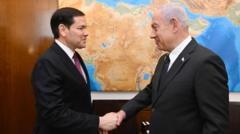What Did Rubio and Netanyahu Discuss After Israel's Qatar Strike?

Published: 2025-09-15 08:50:24 | Category: technology
This article explores the recent diplomatic meeting between US Secretary of State Marco Rubio and Israeli Prime Minister Benjamin Netanyahu in Jerusalem, focusing on the implications of Israel's military actions in Qatar and the broader geopolitical context of the Israel-Palestine conflict.
Last updated: 31 October 2023 (BST)
Key Takeaways from the Rubio-Netanyahu Meeting
- The meeting aims to address the fallout from Israel's recent strike in Qatar against Hamas leaders.
- International condemnation of the strike has put pressure on US-Israel relations.
- Arab leaders are rallying in support of Qatar, calling for a unified response against Israel.
- The US maintains a strategic military presence in Qatar, complicating regional dynamics.
- Future discussions will include Israeli military strategies and settlement expansions in the West Bank.
- The upcoming UN General Assembly meeting may see increased recognition of Palestine by US allies.
The Context of the Meeting
The recent meeting between Marco Rubio and Benjamin Netanyahu comes at a critical time in Middle Eastern diplomacy. The United States has often been a staunch ally of Israel, yet recent aggressive military actions have sparked outrage among US leaders and the international community.
What Happened in Qatar?
Israel's strike in Qatar targeted senior Hamas leaders, marking a significant escalation in military confrontations within a close US ally's territory. This action drew immediate condemnation from various quarters, including President Donald Trump, who expressed disapproval at the attack.
Rubio, who was clearly concerned by the international backlash, stated, "Obviously we're not happy about it. The president was not happy about it. Now we need to move forward and figure out what comes next." This sentiment underscores the complexities of US foreign policy in the region.
The Regional Reaction
In response to the strike, Arab leaders convened a summit to demonstrate solidarity with Qatar. The prime minister of Qatar urged the international community to apply consistent standards when dealing with Israel and to hold it accountable for its actions.
Qatar plays a pivotal role in Middle Eastern diplomacy, hosting a major US airbase and facilitating indirect negotiations between Hamas and Israel. This position complicates the geopolitical landscape, as the US must balance its strategic interests with its diplomatic relations.
The Importance of the US-Israel Relationship
During their visit to the Western Wall, Netanyahu affirmed the durability of the US-Israel relationship, famously stating that it is "as durable as the stones in the Western Wall." This remark highlights the historical and strategic ties that bind the two nations, despite the current diplomatic tensions.
Future Military Strategies and Settlement Expansions
One of the critical points expected to be discussed between Rubio and Netanyahu is Israel's military plans regarding Gaza City. As the conflict escalates, Israel's military strategies have come under scrutiny from both regional and international observers.
Additionally, the expansion of Israeli settlements in the occupied West Bank remains a contentious issue. These settlements are a significant point of tension between Israel and Palestine, often cited as a barrier to peace negotiations.
The UN General Assembly Meeting
Adding to the complexity of the situation, a UN General Assembly meeting is scheduled for next week. Several US allies, including the UK, France, Canada, Australia, and Belgium, are expected to recognise the State of Palestine. This potential shift could further strain US-Israel relations and change the dynamics of the ongoing conflict.
What Happens Next?
The aftermath of the Rubio-Netanyahu meeting will be closely watched. The discussions could set the tone for future US involvement in Middle Eastern affairs, particularly concerning the Israel-Palestine conflict. With rising tensions and international scrutiny, the US may need to reassess its policies to maintain its role as a mediator.
International Implications
The ongoing developments highlight the intricate web of alliances and conflicts in the Middle East. As regional leaders rally in support of Qatar, the US must navigate its relationships carefully, balancing its commitments to allies while addressing the humanitarian concerns arising from the conflict.
Conclusion
The meeting between Marco Rubio and Benjamin Netanyahu is emblematic of the challenges faced in Middle Eastern diplomacy today. As tensions escalate and international reactions evolve, the future of the Israel-Palestine conflict remains uncertain. It will be essential for the US to find a path that promotes stability while addressing the legitimate concerns of all parties involved.
What strategies should the US adopt to foster peace in the region while maintaining strong ties with Israel? #MiddleEastDiplomacy #USIsraelRelations #Qatar
FAQs
What was the purpose of Marco Rubio's visit to Israel?
The purpose of Marco Rubio's visit was to discuss the implications of Israel's recent military actions in Qatar, address US-Israel relations, and explore future military strategies.
Why is Qatar significant in this context?
Qatar is significant because it hosts a major US airbase and has played a crucial role in mediating negotiations between Hamas and Israel, making it a key player in the region.
What are the potential outcomes of the upcoming UN General Assembly meeting?
The UN General Assembly meeting could lead to increased recognition of the State of Palestine by several US allies, potentially impacting international relations and the Israel-Palestine conflict.
How has the international community reacted to Israel's actions?
The international community has largely condemned Israel's strike in Qatar, with calls for accountability and consistent application of standards regarding military actions in the region.
What challenges does the US face in its Middle Eastern policy?
The US faces challenges in balancing its strategic alliances with Israel and addressing humanitarian concerns, particularly in light of rising tensions and regional reactions to military actions.



